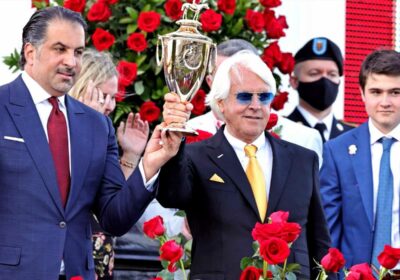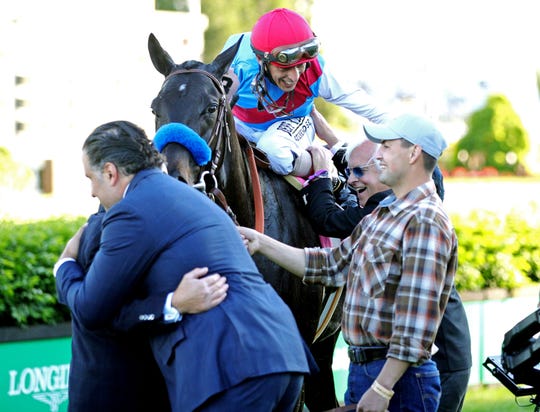Opinion: As excuses for Bob Baffert mount, he doesn’t get benefit of the doubt after Medina Spirit’s positive test

There is one household name in horse racing, a man so well-known that TMZ has stopped him at restaurants and ESPN has invited him to be the celebrity guest picker on "College GameDay."
Bob Baffert is the only person involved in the sport at any level who is likely to be stopped for an autograph or picture away from a racetrack, the product of his ubiquitous presence on television during the Triple Crown and his unmistakeable flop of white hair on top of a head whose eyes are constantly covered by sunglasses.
And now, that may well be the image of horse racing’s greatest shame.
For now, Baffert is still a seven-time Kentucky Derby winner trainer — with a big asterisk next to his latest triumph and a cloud so ominous over his powerhouse barn that it will be difficult to view his success the same way ever again.
WHAT'S NEXT: What happens to bets placed on Kentucky Derby winner Medina Spirit?
Medina Spirit owner Amr F. Zedan (right) and trainer Bob Baffert hold the trophy after winning the 147th running of the Kentucky Derby at Churchill Downs (Photo: Jim Owens, USA TODAY Sports)
Baffert acknowledged Sunday that Medina Spirit, the 12-1 shot who went wire-to-wire in last Saturday’s Derby, returned a positive post-race test over the allowed limit for betamethasone, a common anti-inflammatory drug. If the test is confirmed, Churchill Downs said in a statement Sunday that Medina Spirit will be stripped of the win — something that hasn’t happened since 1968 when Dancer’s Image was disqualified three days after the race after phenylbutazone was detected in his system.
Baffert insisted at a news conference Sunday that he had never treated Medina Spirit with betamethasone, and even suggested there might be some kind of sabotage at play.
At a minimum, this is now a mess that will likely take years to litigate and bring even more suspicion onto the most successful and controversial trainer in horse racing. At worst, a Derby winner being disqualified for a drug test — and particularly one from the Baffert barn — will be the ultimate told-you-so moment for the sport’s many detractors, who have long insisted that many of its most successful participants are chemists as much as they are horsemen.
Either way, this is a complete disaster for racing — but one that has felt inevitable for some time now given how ineffectively the sport is governed and the pervasive sense among bettors and fans that layers of bureaucracy and conflicts of interest have enabled cheaters to slither through the cracks.
Among those who have long been alleged to do the most slithering is Baffert, a trainer whose win rate in the most high-profile races has been remarkable to the point of suspicion.
Jockey John Velasquez aboard Medina Spirit celebrates his win with trainer Bob Baffert during the 147th running of the Kentucky Derby at Churchill Downs last Saturday. (Photo: Jim Owens, USA TODAY Sports)
And in the last couple of years, his critics have had plenty of ammunition in a spate of positive drug tests — all of which Baffert has been able to muddy up enough to avoid becoming a pariah.
When it was revealed a year later that Triple Crown winner Justify had tested positive for a tiny but illegal amount of scopolamine after winning the Santa Anita Derby, it was blamed on jimson weed contaminating his feed.
Two positives last year on Arkansas Derby Day with high-profile horses were blamed on a barn staffer’s lidocaine patch that he’d been wearing for a bad back.
When Gamine was disqualified from a third-place finish in last year’s Kentucky Oaks due to betamethasone — the same drug as Medina Spirit — Baffert said he had given it to her 18 days before the race, which is supposed to be enough time to clear the horse's system.
Another Baffert horse last summer at Del Mar tested positive for dextrorphan, which was blamed on cough syrup being taken by a staffer.
At the very least, give the man some credit for coming up with more excuses than Eddie Haskell.
Isn’t that usually how it goes with drug cheats in any sport? If it’s not outright denial, there’s always always a semi-plausible reason something went wrong.
And you know what? There is in this case, too.
At this point, there is no reason to give Baffert the benefit of the doubt when he says he’s never given betamethasone to Medina Spirit. Maybe it’s true, maybe it isn’t.
But what is true is that Baffert would have to be insanely reckless — brazen to the point of absurdity — to have actually done it.
Given the scrutiny on his operation right now and the fact that Kentucky has a zero-tolerance policy on betamethasone showing up in a post-race drug test, putting that drug in the horse’s body at any point leading up to the race would be begging to get caught.
This isn’t some designer drug that racing authorities haven’t seen yet or snake venom bought on the black market. It’s a common, regulated drug in horse racing. The Kentucky Derby is a race where the participants are thoroughly tested — including for that drug. If you give a horse betamethasone, it’s going to show up as a positive.
For that reason alone, perhaps there’s some reasonable doubt about either the test itself or some other nefarious act that Baffert suggested.
At the same time, it’s hard to have much sympathy here.
With all three positive tests recently, it was something of a nightmare for horse racing when Baffert not only won the Derby for the seventh time but did it with a horse who didn’t really look the part on paper.
Soundly beaten in his previous two prep races in California, he was 12-1 instead of much higher odds only because of the Baffert factor. When he was collared at the top of the stretch by Mandaloun, it looked like he should have been passed. Instead, he kept going, holding on to win by half a length. It wasn’t necessarily suspicious, but it certainly looked like Baffert magic.
Now, there’s a big, bold headline out there suggesting the magic came from a syringe. We should let the process play out before declaring Baffert guilty. But for horse racing’s most famous man, a forever place in its infamy is closer than ever.
Source: Read Full Article

